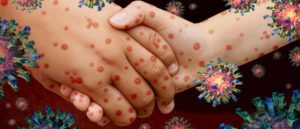
Communicable diseases, also known as infectious diseases or transmissible diseases, are illnesses that result from the infection, presence and growth of pathogenic biologic agents (viruses, bacteria, fungi, protozoa, parasites and prions) in an individual human or other animal host. Infections may range in severity from asymptomatic (no symptoms) to severe and fatal. Transmission of these biologic agents can occur in a variety of ways, including direct physical contact with an infectious person, consuming contaminated foods or beverages, contact with contaminated body fluids, contact with contaminated inanimate objects, airborne (inhalation), or being bitten by an infected insect or tick. Some disease agents can be transmitted from animals to humans, and some of these agents can be transmitted in more than one way.
Some of these Communicable Diseases are required by law in Ohio to be reported to your local health department. The list of diseases that are required to be reported are found on the ODH website.
Please click the button below to report any of the reportable communicable/infectious diseases to CCCHD. Any additional lab work or paperwork can be faxed to our secure fax line at 937-390-5626.
If you would rather complete the “old” Ohio Confidential Reportable Disease form, please click here and fax it to CCCHD at 937-390-5626. This fax is a secure fax.
♦If you need to contact the Clark County Combined Health District after business hours, please call 937-390-5600. You can leave a message for a specific extension or press 5 for a public health emergency. Pressing 5 will prompt you to leave a message, which is then forwarded to the appropriate staff member for response. These calls are answered as soon as possible.
HIV data is considered preliminary until published on the Ohio Department of Health Website.
Annual 2025 Communicable Disease Report
Annual 2024 Communicable Disease Report
Annual 2023 Communicable Disease Report
*To request previous year reports, please email health@ccchd.com
Unless otherwise specified, data contained in these reports is considered preliminary.
*HIV data is considered preliminary until published on the Ohio Department of Health Website.
2025 Quarter 1 Communicable Disease Report
*To request previous year reports, please email health@ccchd.com
MMWR Week 17 (4/20/25 – 4/26/25)
MMWR Week 16 (4/13/25 – 4/19/25)
MMWR Week 15 (4/6/25 – 4/12/25)
MMWR Week 14 (3/30/25 – 4/5/25)
MMWR Week 13 (3/23/25-3/29/25)
MMWR Week 12 (3/16/25 – 3/22/25)
MMWR Week 9 (2/23/25 – 3/1/25)
MMWR Week 8 (2/16/25 – 2/22/25)
MMWR Week 7 (2/9/25 – 2/15/25)
MMRW Week 6 (2/2/2025-2/8/2025)
MMRW Week 5 (1/26/2025-2/1/2025)
MMRW Week 4 (1/19/2025-1/25/2025)
MMRW Week 3 (1/12/2025-1/18/2025)
There are NO current outbreaks in Clark County
- Ohio Department of Health Infectious Disease Control Manual – The IDCM serves as a reference for local health departments and health professionals in Ohio. See Section 3 for descriptions of diseases, diagnostic criteria and other information.
- Know Your ABC’s: A Quick Guide to Reportable Infectious Diseases in Ohio – This document will walk you through the particulars of reporting infectious diseases for Ohio healthcare professionals.
- Ohio Revised Code and Ohio Administrative Code: Diseases
- Reportable Condition Form – When reporting a condition that is reportable (see the link to the quick guide above) including COVID-19, please use this form.
- Tuberculosis Screening – If you would like to get tested or need testing for work please visit the link to learn of the clinic dates and times.
Nursing Phone: 937-390-5600
Secure Nursing Fax: 937-390-5626
Community Health and Data Coordinator: Anna Jean Sauter (x267)
Epidemiologist: Kim Wise (x283)

